Perhaps because Americans as a nation have a gift for organizing, we tend to meet any new situation by reorganization, and a wonderful method it is for creating the illusion of progress at the mere cost of confusion, inefficiency, and demoralization…1
— Charles Ogburn, Jr., The Marauders
To celebrate the first anniversary of pressing publish, I recently revisited both Herd Immunity books. Upon reflection, I have a few minor quibbles but overall I’m happy to announce that both pieces are exactly what I wanted in a finished product. In the case of Herd Immunity: Societal Deprogramming, I would change nothing. If anything, I should’ve gone harder on society:
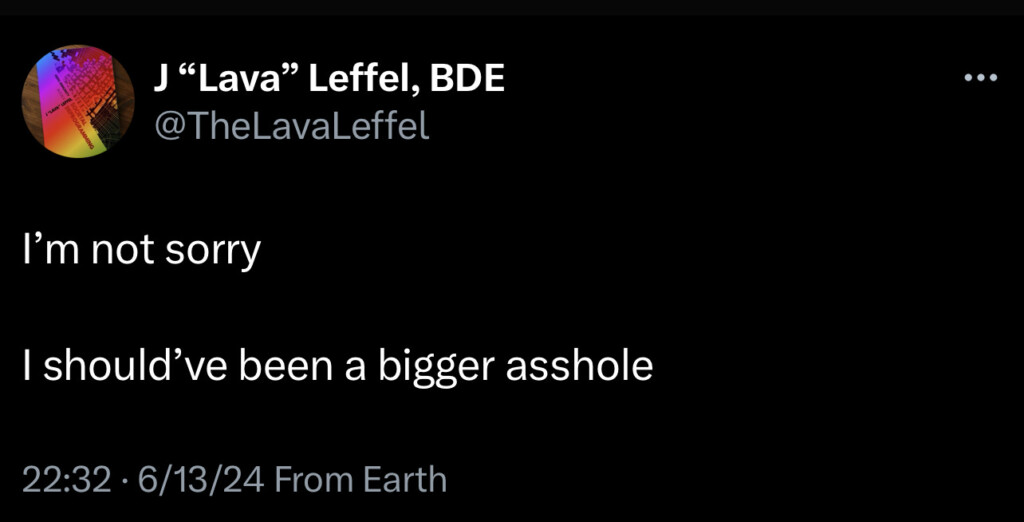
However, my biggest gripe with Herd Immunity: Mental Firmware is poor word choice. In hindsight, I would replace any instance of the phrases “self-help” and “personal development” with “self-actualization.” A cursory search of YouTube reveals that personal development—both the practice and the niche itself—is a steaming, toxic pile of garbage. Whether it’s the constant noise of hustle-porn, people spinning their wheels chasing the almighty dollar, or the incessant dogmatic chatter, nearly everyone uses personal development as a distraction from becoming actualized rather than running towards it.
This article analyzes the failures of personal development you will encounter on your quest for self-actualization. I have already gone all-in on the rotting corpse of the dating niche, which I dubbed the Griftosphere: At some point, I’ll write a sequel to this article, discussing all things Fake Guru: personal development, influencers, and the con artists of the early-20th century. For now, this piece is meant to be an overview of how chasing personal development only moves you further away from finding and becoming your core self.
The personal development industry thrives on the myth of constant progress, which keeps people stuck in hustle-mode. Real growth comes from rejecting the illusion of improvement and focusing on authenticity and self. This is the difference between self-improvement/personal-development and self-actualization—one of these processes is a lifelong educative process of the atman; the other is a racket designed to keep unhappy people chasing their tails and cheap dopamine hits.
A 2018 study concluded that only 10-15% of people have any level of self-awareness.2 Author Tasha Eurich argues that these are not static numbers and that more people could achieve self-awareness with effort. However, after two decades of working with the public—five years of that in education—I’d argue that number is closer to 1 in 20 or 5%. This begs the question: if only one in twenty people has a baseline self-awareness, how few of those have the intellectual capacity to transcend self-awareness and become fully actualized?
This is my biggest issue with the personal development niche: prejudiced parties. There are no qualifications or certifications necessary to become a “guru” in the age of internet hyperrealities. For the cost of a few photo shoots, a YouTube channel, and a couple virtual assistants in the Third World, any hustler can create an online presence in a month’s time. Most people that seek out personal development information are attempting to solve one valid pain point: weight loss, treating addictions, a better career, and love are the biggest reasons people search for advice. Are we to assume that the only people who reach the pinnacle of self-actualization are those who create an online presence to market products and services? You can find 16-year-old “crypto millionaires” on TikTok and YouTube ads. How can these people are fully integrated and actualized when their frontal lobes aren’t fully developed? This begs the question: how can one sell books, products, courses, seminars, masterminds, and all the trappings of “self-development” when they lack self-awareness? In many instances, the same people preaching self-actualization lack the self-awareness to see fraud at eye level.
Suppose for argument’s sake, you meet one of these “actualized” gurus—an Osho, Sadhguru, or Krishnamurti-type—even if they’ve achieved Nirvana, that doesn’t mean they’re qualified to teach it, or that those who seek counsel will be in the proper headspace to receive it. Even a guru with the best of intentions spends years learning how to distill his message to his followers. Every year I worked with students, I became better at explaining complicated concepts to young thinkers, but if they were unwilling to learn, it fell on deaf ears. This is where self-actualization gets lost in the sauce. Self-actualization is a lifetime process, and most will never achieve that level of enlightenment to teach it. Once they do, who’s to say they’ll be inspired to teach their secrets?
Aside from prejudiced parties, personal development suffers from a paradox of practice and a shortcut bias syndrome. Before a person can become actualized, first they must have self-awareness. The fact that anyone can go on Amazon or a bookstore and buy a book on personal development is the first crucial lesson of self-actualization: be weary of anyone selling you shortcuts or enlightenment. “Self-actualization” goes beyond the superficial gains of personal development. The personal development industry doesn’t understand this (or conveniently neglects to say this) because it thrives on endless, superficial “improvement” cycles that keep customers in their marketing funnels. The parlance of the industry—phrases such as “improvement” and “upgrade”—misrepresents self-actualization by focusing on adding, changing, or enhancing the subject. Self-actualization isn’t achieved by “addition;” but rather, by “subtraction.” To put it bluntly, you must unlearn all the bullshit you learned by seeking others’ advice and frameworks. It is a painful, lifelong process that strips away socially-ingrained layers until what remains is the genuine self.
Prelude: The Self-Improvement of Salvadore Ross
The Salvadore Ross program for self-improvement. The all-in-one, sure-fire success course that lets you lick the bully, learn the language, dance the tango and anything else you want to do. Or think you want to do. Money-back guarantee. Offer limited to…the Twilight Zone.3
— Rod Serling, The Twilight Zone
In many ways, personal development hasn’t changed much since Napoleon Hill published Think and Grow Rich. Before discussing fake gurus selling overpriced courses and seminars, I want to share an important lesson from The Twilight Zone. Since I’ll be spending 2025 writing some Twilight Zone content, I want to share a parable from the fifth dimension and give myself a little practice.
“Why can’t I want something in my life and get it!? Just once!” exclaims Salvadore Ross, punching Leah Maitland’s door in frustration, breaking his hand.4 Sal’s journey into the world of self-improvement begins like many: frustration, spinning his wheels, and now in physical agony:
Confidential personnel file on Salvadore Ross. Personality: a volatile mixture of fury and frustration. Distinguishing physical characteristic: a badly broken hand, which will require emergency treatment at the nearest hospital. Ambition: shows great determination towards self-improvement. Estimate of potential success: a sure bet for a listing in Who’s Who in the Twilight Zone.5
Although Ross doesn’t yet know it, his tale will serve as a cautionary one. Even though this story is one of fiction writers, many real people have entered the lifelong hamster wheel of self-improvement for the same selfish reasons. In the interest of brevity, I’m gonna be a bad writer and lift Wikipedia’s synopsis:
Salvadore Ross is a brash, insensitive, ambitious 26-year-old man who desires a lovely young social worker named Leah Maitland. Leah and Ross dated for a time, but she broke off the relationship because their personalities are incompatible. When Ross continues to bother her, Leah puts her foot down and finally ends things. He has been so loud that her father has come out to see if she is all right. After a curt exchange, they go inside and Ross slams his fist into the closed door, breaking his hand. This sends him to a local hospital, where he is forced to spend the evening. Ross’ roommate is an elderly man with a respiratory infection. Ross sarcastically suggests that he would like to trade ailments with the old man, who jokingly accepts the trade, and they go to sleep. Salvadore turns over quickly and hits his hand. He then realizes it no longer hurts and begins to unwrap it. As he unwraps it, he begins to cough. He gets out of the bed and checks the other man, whose hand has begun to hurt. The old man begs Ross to reverse this (at his age, the hand wouldn’t heal properly), but Ross dismisses him.
Ross realizes he has a supernatural power to make trades with other people. In exchange for $1,000,000 and a penthouse apartment, Ross sells his youth to an elderly millionaire. As a result Ross is now very rich, but old. He offers a number of young men (beginning with a hotel bellboy) $1,000 for each year of their lives they trade to him. In short order, Ross is 26 again.
Ross is now young, rich, and (thanks to a trade with a college student) well-spoken, so he goes to Leah’s apartment. Her father is there and unimpressed with the superficial change in Ross, knowing that he does not love Leah, but simply wishes to possess her. Leah comes home and, after she sees Salvadore has changed his ways some, agrees to go to dinner with him. However, by the end of the date she is again repulsed by Ross’s personality. She wants a man who is as caring and compassionate as her father. Frustrated, Ross approaches Mr. Maitland, who is kind to him despite his disrespectful and condescending demeanor, but does not think he would be a good husband for his daughter. Ross offers him $100,000 to make him and Leah financially secure in exchange for something from Mr. Maitland. When the father asks what he has, Ross says, “Well, it’s a little hard to explain…”
The next day, Ross has become warm, compassionate and has won Leah’s heart. Ross meets with Mr. Maitland in private to apologize for his previous behavior and asks for his permission to marry Leah. Maitland refuses. Ross implores the older man to show compassion. Maitland coldly replies, “Compassion? Don’t you remember? I sold that to you yesterday” and shoots Ross dead.6
Salvadore Ross is a brash, insensitive young man obsessed with possessing Leah, not loving her. Ross trades everything in an attempt to mold himself into the man he thinks Leah desires. But Leah doesn’t want a man who merely looks the part. In a pivotal exchange, she explains, “It’s not something you can buy. It’s the kind of person you are. The things you care about, the people you care about.”7
What Leah is referencing—but Ross can’t understand—is self-awareness. She values traits like kindness, humility, and compassion; qualities that come not from ambition but from understanding one’s self. Leah’s version of self-actualization rests on empathy and self-understanding, qualities Ross lacks because he sees self-improvement as a checklist rather than self-discovery. His disregard for others in his pursuit of Leah reveals his belief that he can fabricate any virtue he lacks, so long as he has the means. In Leah’s words, “The man I marry is gonna have to have compassion because otherwise, I won’t be able to love him.”8 She reveals her core insight: real growth is not about impressing others or gaining approval, but about in inner values. Leah’s definition of the “right man” is one of depth and empathy—qualities Ross cannot buy nor exchange.
In Ross’s final attempts to manipulate Leah’s affections, he bitterly asks, “What kind of guy is right for you, Leah? Well, you tell me what kind of guy is right for you, and I’ll be that guy.”9 Leah sees that Ross will always lack depth and humility, because he treats change as a transaction rather than an evolution. For Leah, compassion and self-awareness are non-negotiable parts of true self-mastery; you either have them, or in Sal’s case, you don’t.
Ross’s story demonstrates that without self-awareness, self-improvement is a hollow façade that produces neither fulfillment nor love. The tragedy of Salvadore Ross is that he remains trapped in a transactional mindset, leaving him blind to the one insight he needed most: self-actualization is not a program, a shortcut, or a sale. It’s earned through humility, empathy, and a deep awareness of one’s place in the universe.
Ross’s story offers a chilling reminder: self-improvement without self-awareness is like building a house on quicksand. Just as he chased the traits and trappings of success without changing his core, many people today are lured by the promise of overnight transformations, overlooking the need for self-understanding. Could it be that self-improvement rhetoric has devolved into mistaking shallow gains for real growth, causing the masses to unknowingly sleepwalk through our own lives? Or has self-improvement always been a way for hucksters to make a quick buck promising overnight transformations to shortcut-seekers on the come-up?
The Pyramid: Hierarchies of Empty Promises
Presenter: Hey! Who wants to get rich today?
Homer: Me! Me —Me! Me! Me! Me! I said it first.
Presenter: Let me assure you that this is not one of those shady pyramid schemes you’ve been hearing about. Our model is the trapezoid that guarantees each investor an 800% return within hours of your initial—Uh-oh! The cops!10
— The Simpsons
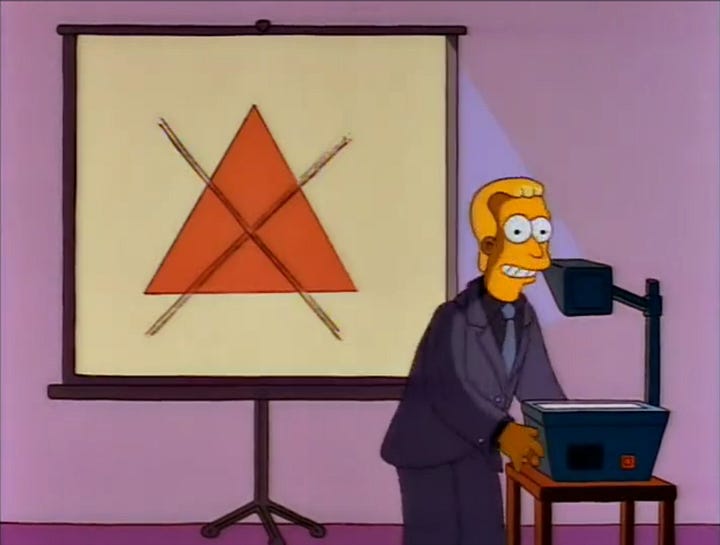
My hierarchy of self-actualization is a teensy bit different from Maslow’s. My working hypothesis is that psychology has devolved into pseudo-science, feelings exploration, and selling pills to hijack children’s pathologies, so it doesn’t surprise me that Maslow and I disagree. While I’ll never lay claim to being an expert in psychology or psychiatry, I have a world-class bullshit detector (unlike Joe Rogan, who claims the same and then partners with shitty comics and snake-oil salesmen at every turn). As such, if I know these people are bullshitting me, what are the odds that they’re also bullshitting you? It doesn’t seem as though the American Psychological Association (APA) is as interested in solving mental anguish as much as they are diagnosing and categorizing it.
Unlike Maslow and the APA, my pyramid is an attempt to cut through the dogma of the psychology and personal development industrial complex, and get straight to the crux of the matter. My pyramid only has three rungs, and I’ll tell you them all today for the low, low price of 15–20 minutes of time and attention span. No add-ons, upsells, sales pages, slimy tactics, false-time constraints, or exploding offers necessary. You read the article, and the path unfolds before you.
Everyone’s pyramid (including Maslow’s) is bound to look a bit different, based on personal needs:
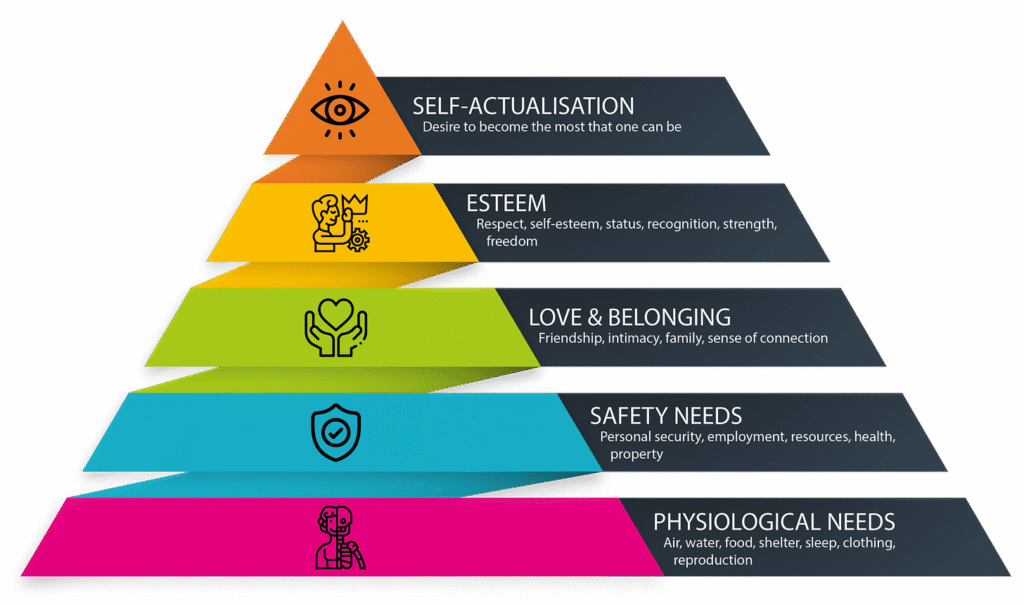
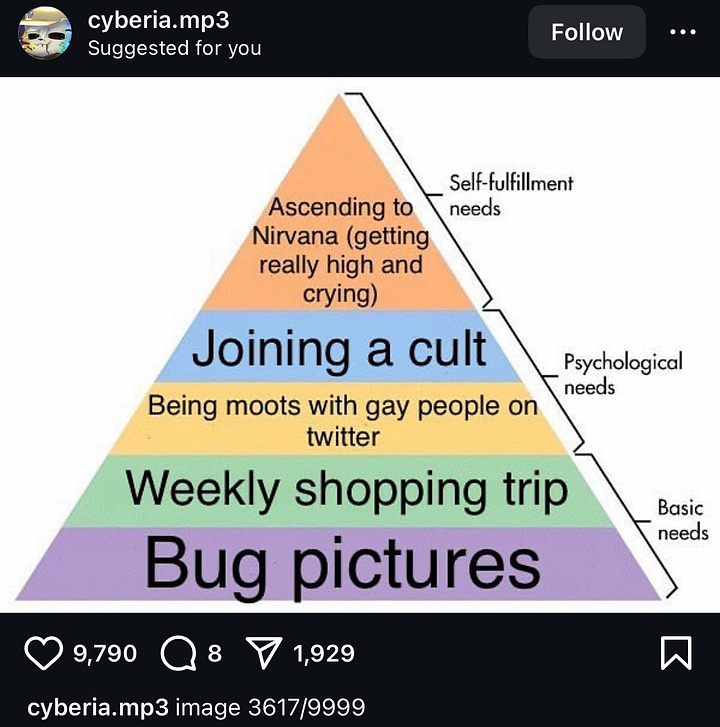
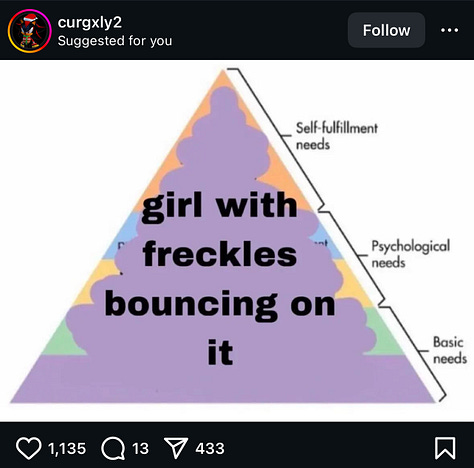
My pyramid is: self-awareness // self-realization // self-actualization. To give a cursory breakdown of these levels: self-awareness is realizing what makes you tick; self-realization is recognizing what you want out of life; and self-actualization is fully embodying the self, without apology or compromise. Maslow argues that base needs (such as food, clothing, and shelter) are necessary before moving onto more pressing psychological matters. I argue that most people use self-improvement solely to improve only their base desires: better food, nicer clothing, fast cars, and opulent dwelling spaces. As such, they spend their time and energy upgrading the base of the pyramid, and never ascend to higher levels. This was Sal’s problem as well. He built an impressive base, not realizing that Leah was looking for a man several levels higher than Sal’s consciousness, not wider. This is the first trapping of personal development, hustle-porn, and striving for success: people erroneously believe they can build a taller pyramid by building the widest base. Or they choose to build the “trapezoid model” from The Simpsons quote above, neglecting the cap of the pyramid.
I know what you might be thinking: only three steps? Sweet. I can bang this out in a weekend. Not so fast, my friend! It may seem like a fine line between self-awareness and self-realization, but if we use the 2018 study cited in the intro, only 10-15% of people have self-awareness. That’s not to say they can’t ever gain it, but without it, there is no way to move further. Between self-awareness and self-realization, there could be infinite levels of personal growth that one must work through. This is where the 15% who allegedly have self-awareness get stuck. If 85% of society is stuck in self-awareness and the remaining 15% is stuck in self-realization, what are the odds that you or someone you know will ever achieve self-actualization? Not very good if you’re using self-improvement only to make more money, get hotter girls, and buy faster cars and nicer homes.
Internalizing the above paragraph is the first step to graduating “self-awareness.” There is no shortcut! And the longer you spend chasing the trappings of success or following other guru’s paths, the further you stray from self-awareness. Most people spend their entire lifetime never understanding this simple truth. However, the thought leaders in the personal development niche understand this very well. The ones with the best intentions delude themselves into believing their followers can achieve more than their mental bandwidth allows. The nefarious ones know their sheep are ripe for shearing and put the secret behind expensive paywalls.
Self-realization is one of the best “courses” to gamify and commoditize, selling hacks, shortcuts, and easy buttons to a mass audience. Even when their audience comes from varied backgrounds, they can sell the same endgame: a nebulous concept or buzzwords, such as happiness, wealth, and success. Graduating to self-realization means learning that there are no shortcuts and no one can sell a done-for-you process. You must abandon others’ paths and do it for yourself.
An addendum: even though self-actualization is represented as a pyramid in both my and Maslow’s hierarchy, growth is never a straight line. It is a lifelong process that nearly every human in history has failed to complete. None of these gurus, thought leaders, and blowhards can teach you how to be you. You have to remove all those voices and return to your core. Most people never do this and that’s why they stay stuck on the personal development hamster wheel, chasing euphoria, shiny objects, and new coaches to tell them the same things they already knew. Self-actualization means you grow by doing, not by ‘spreadsheeting’ or scheming. It means listening to that little voice in your head that you’ve muted in favor of someone else’s advice. Or, as David Viscott wrote in Feel Free: “The first step on the journey to personal freedom is always a journey within ourselves.”11
If your goal is self-actualization, then 99.9% of the people in the world aren’t equipped to lead you there. What keeps the personal development niche a multi-billion dollar racket is that nearly everyone walking the planet is unaware of themselves and unhappy with their current station in life. What’s worse, in their search for easy answers, people want a “done-for-you,” cookie-cutter, path of least resistance to achieve their goals. The irony is that chasing easy answers only creates more busy-work, and leads them further astray.
The Easy Button: Chasing Easy Answers to Avoid Hard Work
Self-development does take time, but anybody who cuts out busy-work will find many hours in the week to accomplish more.12
— David Viscott, Feel Free
In order for the personal development scheme to work, it only takes one guru to sell you this basic premise: who you are in this current moment is not working. If you felt complete and fulfilled, you wouldn’t need to change. Most people never take the time to be alone with their thoughts, to figure out who they are, and then to go after what they want. David Viscott touched on this phenomenon decades before social media’s propagation of selling quick fixes: “[t]he pressure to be better, to be smarter, to be richer is so great that few of us have ever taken the time just to be good at something we enjoy and to enjoy something just because we are good at it.”13 Most of us never take the time to just be ourselves, because we’re being inundated with messages stating that we’re incomplete, and we must become someone else to be happy and fulfilled.
The thought-leaders in this space understand this, and use personal development to sell you needless programs, rituals, and mantras to busy up your brain and life. Most people buy into this hook, line, and sinker. Rather than taking a year or two to reflect and soul-search, they’re waking up 5 at A.M., doing journaling and affirmations, sticking coffee up their ass, sunning their balls, and diving between hot saunas and cold plunges. When they’re not doing some pointless busy work and rituals, they’re meditating, visualizing, and manifesting. And to what end?
We’ve become a species of busyness, never giving ourselves a free moment to just exist. This is a direct result of the hustle culture that permeates personal development and social media. You have some former Navy SEAL or Marine demanding you wake up at 4 A.M. and go out and do four hours of busy work hustling while the rest of the world sleeps so you can get ahead of the herd. And for what—a smug sense of satisfaction/accomplishment? If most people didn’t work jobs they hate, to buy pointless shit they don’t need, to impress people they don’t like, most people could work less and have a four-hour “achievement” block any time during the day to dedicate to personal and professional goals. Most people fill their lives with pointless busy work before any personal development routine. It’s no wonder most people are stressed out, anxious, and sleep-deprived. Adding more work into an already cluttered life won’t bring you fulfilment or actualization. Again, the key to actualization is subtraction, not addition. If your life is already cluttered with commuting, meetings that could’ve been emails, and pointless fraternization, what good is waking up before work to do more tasks? Without all these pointless rituals and routines, you’d have more time to focus on one or two daily tasks that bring you joy. Most rituals, routines, and mindsets are pointless and exist to sell you easy answers and busywork.
Consider the classic Simpsons episode Bart’s Inner Child. [Oh, Jesus Christ, there he goes on The Simpsons again! Let’s get a coffee, this is gonna take 20 minutes] I’ll be brief, I promise—A self-help coach comes to Springfield and makes a killing preaching generic platitudes and exclaiming that everyone in town should like act Bart, who represents the integrated and actualized “inner-child” everyone is trying to achieve. Lisa correctly exposes the charade, but the town doesn’t care. They’re already swept up in the feel-good moment:
Lisa: this is madness. He’s just peddling a bunch of easy answers!
Carl: …and how!14
After the seminar, everyone in town co-opts Bart’s slacker identity, goofing off and shirking their responsibilities. As a result, Bart becomes depressed and feels he’s lost his identity. Lisa urges him to develop a new and better identity. Ultimately (or perhaps because it’s a sitcom) the episode ends, and the town reverts to normal, with Bart being himself. This episode distills the essence of personal development as a racket: sell people a bunch of easy answers and give them needless tasks so that they feel good at achieving. Many coaches also tell you to adopt avatars, role models, or do character studies of successful people whose lives you’d like to live. Instead of learning who you are, it’s better (and easier) to act like or become someone else.
Both of these notions represent flaws within the personal development niche. You’ll never become actualized by co-opting someone else’s identity. When you find yourself depressed or lacking an identity, the solution isn’t to invent a new persona. Rather, this is your gut telling you to strip off those societal-created layers to get to your core self. People become personal development junkies, busying their life with needless mental chores, believing they are cultivating a better self. They’re just adding needless layers that take them further from themselves.
Every time some personal development guru tells you to adapt someone else’s thinking, habits, morning routine, or mindset, you add another false layer that must be removed. The same with society—your parents, teachers, counselors, and other prejudiced parties did you no favors by molding you into someone else’s definition of success or normalcy. By the time you become an adult, you’ve added so many layers to yourself, that “inner child” can’t be felt or heard. You can’t become actualized by turning yourself into a metaphorical Ed Gein—wearing other people’s layers and expecting transformation. At best, you’ll become a changeling; at worst, a real-life Patrick Bateman wanting to fit in.
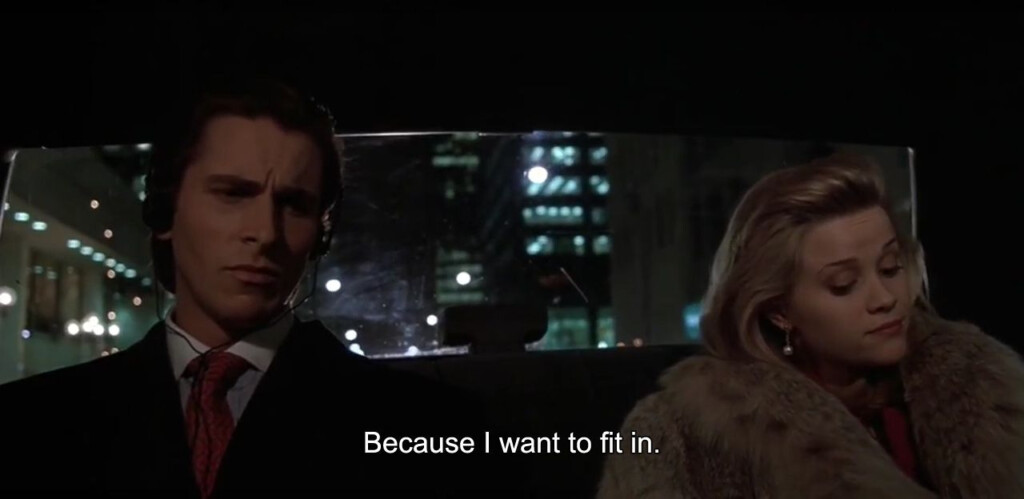
Don’t believe me? This 2:40 video sums up this argument with lots of pretty anime visuals. I’ll see you back here after you finish it:
There’s a fine line between the challenging work of self-actualization and the pointless mental masturbation and “busy work” of self-improvement. The 85% stuck in self-awareness will never overcome this because they’re too busy adding to their lives, rather than subtracting. How can you know yourself when your mentor is urging you to act like someone else? It’s equally insidious for the 15% of people stuck in self-realization. These people already have some sense of self, yet they keep adopting others’ rituals, habits, routines, and busy work to fill their days. If your goal is to become your best self, why are you using other people’s frameworks? Even if these coaches have the best of intentions, they’re allowing (and enabling) their followers to delay actualization, replacing it with feel-good platitudes and pointless busywork. Personal development becomes another form of homework.
When your mentors and coaches sell you process, ritual, and routine, your day is busied with optimizing and neglects the growth of existence. David Viscott agrees with this: “The philosophy of overwork has systematically robbed us of our youth—not the years, but our belief that it is possible at any time to do anything we really want to do. There is nothing you can’t have if you are willing to work at it, we are told; except maybe peace of mind in finding ourselves.”17
There is no easy button! Every action and inaction has consequences. Working hard at the wrong things never brings you closer to happiness and fulfillment. Stop trying to shortcut progress by adopting fake personas, pointless rituals, or worse—trying to buy your way out of hard work. The more you linger in these circles, co-opting others’ personas, the longer it takes to remove these layers and find yourself. Self-actualization is difficult, life-long process, which flies in the face of my next gripe: gamifying progress.
Gamifying Development: When Growth Becomes Points and Levels
How bored can you be when you have access to the entire world on your phone, and you choose to play a 99-cent game where you can get in-app purchases to buy swords…? I’m telling you—you can’t be playing games on the phone…
So now that we have every possibility of something to do online, the fact that you’re gonna play a throwaway game that puts your brain in limbo, just to kill time, you might as well shave those years off your life. You might as well start smoking cigarettes, ‘cuz what do you need those extra days, months, and years for? If you’re shaving them off with your brain and body in limbo playing these nonsense in-app purchase games. It’s sick!
You basically put your brain on autopilot, and you’re just waiting for the day to pass.18
— Mike David, Red Bar Radio
I don’t like the idea of gamifying your life to distract yourself from personal growth. If you want to play a video or board game to pass the time, that’s your right. However, let’s not kid ourselves that playing 5 minutes of Duolingo a day is the same as teaching ourselves a foreign language. Just like many linguistics experts preach immersion to their students, self-actualization is also a immersion process. You’re either all-in or all-out. No amount of experience points, fake badges, or invisible karma will get you there.
I don’t think that your life is as difficult as slaying the literal personification of evil in Diablo. That doesn’t mean life is a sandbox-mode simulation like The Sims either. An argument, however, could be made that turning your real life into Stardew Valley—quitting a soul-crushing tech job to live a simple life off the land—could be more advantageous. The process of self-actualization is meant to be difficult, and you should avoid anyone telling you otherwise.
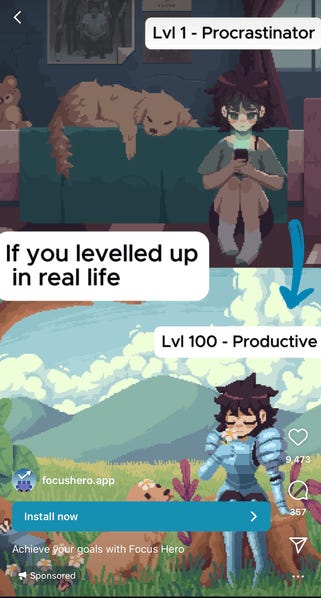
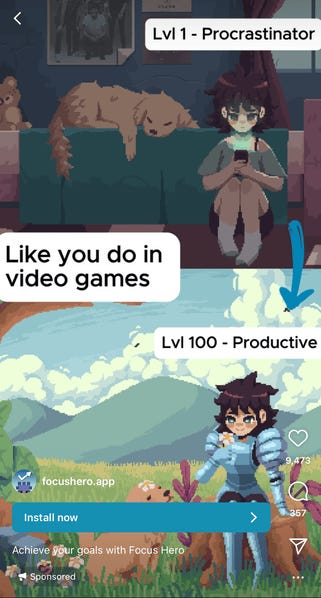
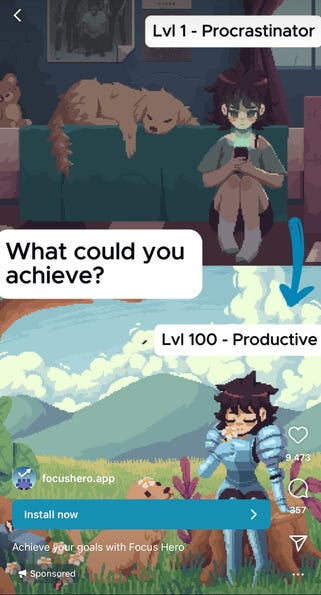
However, that doesn’t stop marketers from telling people that “life is a video game” and you should gamify the development process. I understand where they’re coming from: marketing a difficult, life-long process to the world’s citizens as they race to become the real-life embodiment of Wall-E or Idiocracy. As insidious as it seems, it makes sense from a marketing and sales standpoint. The average person says they want to become fully-actualized, but what they mean is that they want the good feelings attached to a pointless sense of accomplishment and achievement. Knowing this, a smart guru, coach, or marketer will attach achievement and accomplishment to their products and services, selling quick dopamine for completing trivial tasks. Mobile game-makers have the market cornered on hooking people with accomplishment: gacha systems, pointless badges and awards, and arbitrary missions and checklists to keep people busy clicking and buying. It shouldn’t surprise anyone that digital marketers and personal-development gurus have latched onto this.
This is from an email from digital marketer Dan Koe, published 8/26/23. I used to really like Dan, but the problem with following any of these digital marketers is the “hivemind mentality” of chasing belongingness and acceptance. I’ll discuss this issue in the next section. For now, let’s just focus on the myth of gamifying life:
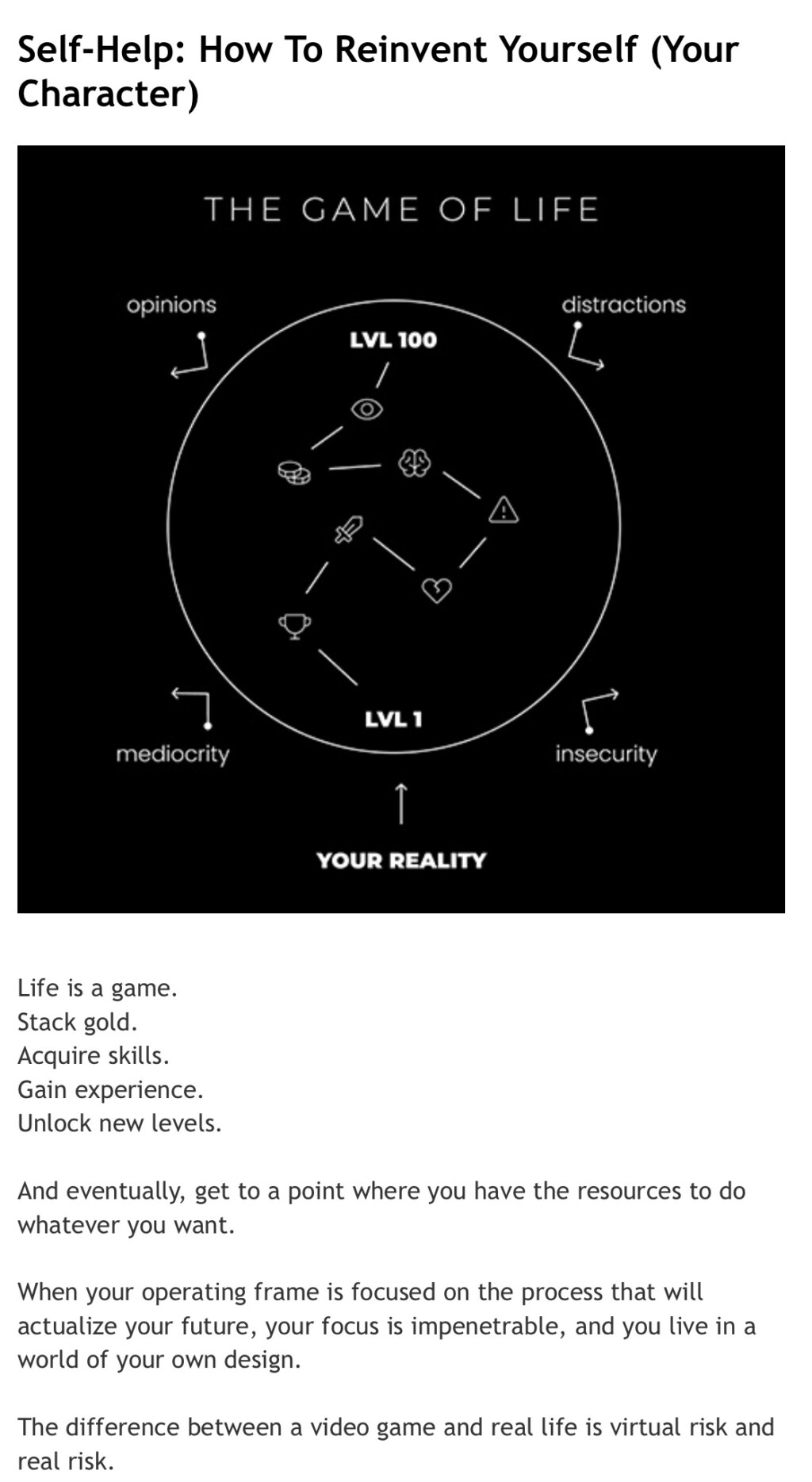
Many of these writers urge their followers to “gamify” their lives, an attempt to make a difficult process easier. As an avid fan of Japanese RPGs, I understand grinding for experience points, new spells, and money to buy better equipment better than anyone. If self-actualization were as easy as grinding levels in a make-believe dungeon, anyone could do it. Ignore the video game and the isekai sub-genre of anime telling you that killing waves of slimes in a dungeon will solve all of life’s problems.
While gamification might work to distract oneself from difficult short-term goals, it fails as a framework for life. Gamification trivializes growth by reducing a difficult process to mere achievements or rewards. This is dangerous because it teaches people to see growth as external validation rather than internal discovery. In addition, we grow more from tackling a difficult challenge rather than a trivial one. When facing hard truths about yourself, there’s no “achievement unlocked” for genuine change. The satisfaction comes from facing a difficult challenge with courage.
This is an important lesson that many people missed while watching the anime series Toradora. Ryuji Takasu has a crush on captain of the softball team, Minori Kushieda. Because of this crush, Kushieda has a glow of brightness surrounding her in both her beauty and cheerful demeanor. It’s only after Takasu and Kushieda get locked in a storage room that he learns that Kushieda’s glow isn’t just a halo effect.19 He reasons Kushieda is bright and cheerful because she faces her fears. Gamifying development trivializes the heavy lifting and distracts people from honest self-confrontation. Although Kushieda “busies” herself with softball, school work, and several after-school jobs, she still understands that self-actualization is a long process that can’t be shortcut.
People attempt to gamify self-actualization as a means of distraction. Substituting or masking a difficult change as a feel-good adventure misses the point of actualization. David Friedman discusses this in an interview with Jerry Gillies in Moneylove:
People have this illusion that they’re going to feel good—there was one new thought saying I saw that said, “You know you’re on the right track when you feel good.” Baloney! I just had some successes recently, and I am so anxious and so uncomfortable. These are things I hadn’t allowed myself to have up to now, and now I know why.
A friend of mine said to me, “I don’t know why I drink so much.” So I said, “Would you like to find out why you drink so much?” And he said, “I really would.” So I said, “Stop drinking and you’ll immediately find out.”
I think that one of the things that stops people is they’re looking for the next book or the next method or the next whatever that will just let them circumvent everything, and then they’ll be fabulous and it’ll be fine. But you do not circumvent yourself, and things that happen in the world don’t bypass that. It’s like your little child is being left behind and it won’t tolerate it.20
Friedman continues:
These things have to be mined and brought to the present. And most of us live our lives trying to overcome this child, trying to crush it, trying to make it disappear, by being successful, by having money—it doesn’t work.
You have to go back and get the child. And then your natural ability, that’s the thing that people don’t recognize, that money and success and stuff is natural. Not some big weird thing that is being withheld from us. The use of our talents is natural to us. It’s what comes up from the past that prevents us from doing that.21
Unfortunately, most people would rather neglect their inner child by playing pointless games and needless busy work. Until people favor the hard work over easy distractions, gamifying accomplishment isn’t going anywhere. Even the fucking Dunkin’ app gives you little badges for frequent business and ordering seasonal goodies. For the low, low price of $50, you can get “diabeetus” and a digital sticker on the app that only you can see:


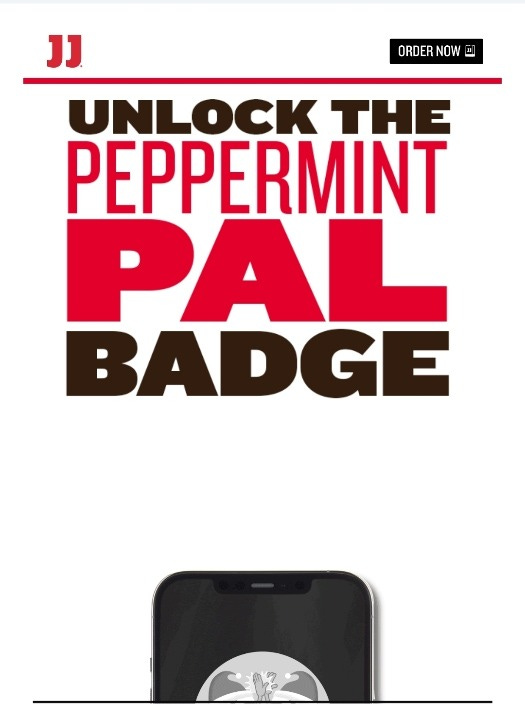
Self-actualization requires facing difficult truths without rewards or encouragement, instead of constantly seeking validation or “leveling up.” It also requires leaving the safety of the hive and making the arduous journey alone.
[2025 Update: I’m not a fan of “leveling up” your life, but if you’re dead-set on viewing reality as a video game rather than disconnecting from gamification, Chase Hughes explains it in the least objectionable way:]
The Hivemind: Why Groupthink Kills Self-Actualization
…So this next piece of material—like most good ideas—is fairly simple: it’s just a list of people who oughtta be killed!
Starting with these people who read self-help books. Why do so many people need help? Life is not that complicated: you get up, you go to work, you eat three meals, you take one good shit, and you go back to bed! What’s the fucking mystery?
And the part I really don’t understand—if you’re looking for self-help, why would you read a book written by someone else? That’s not “self-help”, that’s help! There’s no such thing as “self-help”—if you did it yourself, you didn’t need help! You did it yourself. Try to pay attention to the language we all agreed on.23
— George Carlin, Complaints and Grievances
During a recent conversation with a good friend, I realized that I have zero desire to help men or women become the best possible versions of themselves. This is not my goal now and never has been. My goal with Herd Immunity is to reach a very small subsection of society: those who realize every facet of modern society is bullshit. That percentage of people could be as small as fifty or as large as fifty million. The process of writing and releasing my book taught me that I had no desire to be a guru. If people read my book and get a few good ideas and a couple laughs at my expense, that’s good enough for me. I have no desire to be a cult-leader, guru, or a leader of men. I realized a long time ago that all tribalism is just a “team sports” mentality where in-group bias reigns supreme. I have neither the time nor the desire to spend my remaining years on this planet hanging around stupid people looking for an ideology.
More than an issue of linguistic semantics, self-actualization through groups and belonging has been repurposed as a marketable benefit, creating a dependency on groupthink rather than individual thought. A cursory reading of Alfred Adler’s core philosophy, one can surmise the merit of “community feel” in relation to society. We all play a role in our families, towns, businesses, and to a larger extent, the human race. However, community feel has limited value if it requires relinquishing one’s liberty or core values for the greater good. Self-actualizers don’t need group validation or collective milestones, they need to stop being validation-seeking weirdos, and face some difficulty in their lives.
I gave an example in Chapter 7 of Herd Immunity: Never Get Fat. I travelled to Vegas for a conference, and nearly everyone in the casino was monstrously obese and could barely walk. What I didn’t discuss was that I went to Vegas to attend a conference for a prominent dating coach. What I observed during this conference was that nearly every man in attendance dressed, walked, and talked EXACTLY like the coach. They weren’t trying to get laid, or be the best versions of themselves; they were trying to BE HIM! I found this unnerving. This reminds me of one of my favorite moments of Red Bar Radio. Mike was reviewing a video of a former intern’s latest grift—pretending to be a dating coach:
…And by the way, when he was an intern for us, none of this was a thing. This is like a new personality for him. He was never a guru or a self-help guy. This is just a—like imagine if you knew somebody who never did this, and they just started doing it. Wouldn’t that be crazy? That’s why we’re reviewing this…24
In the previous section, I discussed an email from marketer Dan Koe. If you look at the comments section of Koe’s videos or tweets, nearly all of them are blue-check “verified” sycophants rehashing his content to steal likes and followers. They take Koe’s words and repurpose them as their own, yet they don’t take his words to heart. I consider people like this to be digital parasites or content tourists: “I’ll take a little from this creator, a little from this creator, a little from this creator. Mash them all together, and then I’ll sell my own products.” Nope. You’re just a plagiarist, and a poor one at that.
Many of these content tourists join these communities to fit in because they think that’s how they will find themselves. It doesn’t work that way. This phenomenon isn’t Dan’s (or other coaches’) fault. It’s the fault of people who enter personal development for a sense of community and belongingness. Perhaps I’m being harsh, but more content creators should discourage their followers from being mindless automatons who rehash others’ content for fake video game points. Where I do blame Dan is when he sells courses and masterminds, teaching people how to build businesses working four-hours a day, rehashing other people’s content as your own books and courses. Online courses are the newest form of pyramid schemes.
A few years back, I noticed this trend, where coaches began to promote “limited access” Telegram chats and Discord servers as upsells or value bombs. This is just monetizing community feel; it’s an add-on to justify charging more for a worthless product or service. “You’ll have instant access to me and all the other badass, fast-acting, action-takers in the group.” Bullshit! Then they’ll attach some arbitrary dollar amount to show this bogus group has actual value. “Access to my private telegram chat/direct access to me and my coaches $997 value. Free!”
Even Andrew Tate, the anti-video game, anti-nerd, anti-Star Wars, crypto “daddy,” and alleged human trafficker, turned his fake Discord server The Real World into a gamification platform. I should say “stolen fake Discord server” because one of his employees stole an open-source Discord competitor and tried to pass it off as Tate’s, resulting in a huge data breach for thousands of users.25 Tate’s pay pigs shell out $50/month to earn badges, snazzy chess avatars, and other dopamine-hacking online paraphernalia. Yes, escape The Matrix of porn and online gaming, and join The Real World, full of gamification gimmicks and hustle-porn.26 Spending $50/month for a shitty gacha game where autismos flex as Top-Gs and pretend to have friends seems silly even to me, and I’m a child of divorce. Just like in real life, no one accomplishes anything of substance on The Real World. It’s a platform where losers flex about making thirteen dollars drop-shipping. Selling community and gamifying developing—talk about a grifting twofer!
From a marketing standpoint, it makes sense to tell your mindless followers to join a following. They’re going to spend money on something, it might as well be your products. If you need more proof that these fake gurus are marketing community over actualization, I came across this Instagram carousel by user “prettylittlemarketer.” In it, she tells her audience the future of marketing is community. It’s not enough to sell products and services, if you want to create rabid fans that buy you as a brand, you must sell belongingness:’
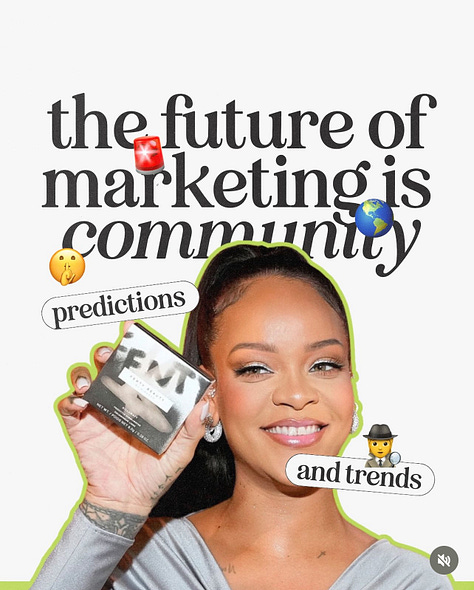
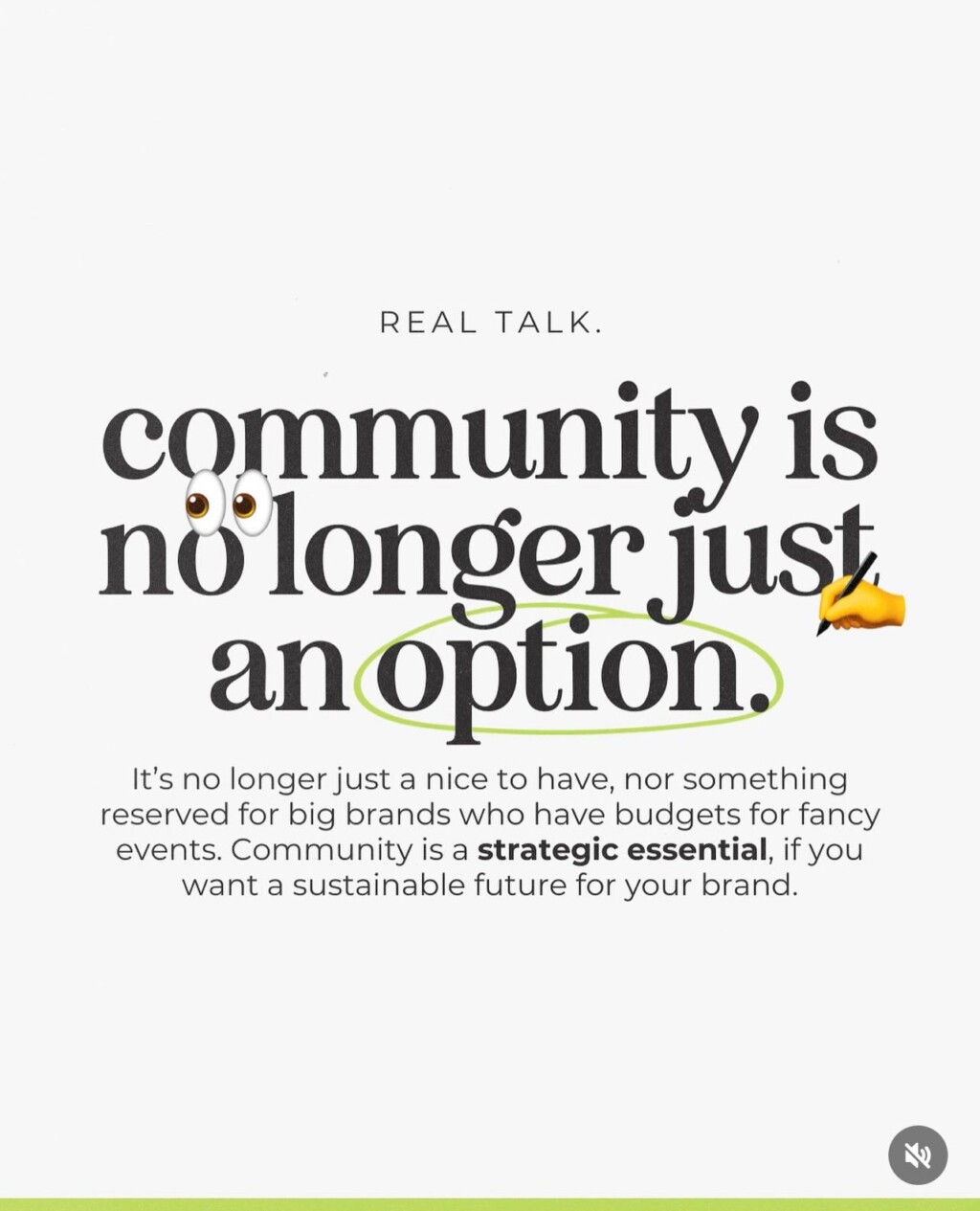

Social media allows anyone to create a little clique of friends and followers online. However, this is something more at play here. This is manipulating human nature and desire for belongingness so that you can monetize friendships. If I were a professional streamer or online coach, the last thing I would want to do is spend my offline time talking with other streamers and followers. However, for many, these are the only interactions/friendships they have. As Cal Newport argues in his books and videos, the insidious side effect of social media is that it “…makes you feel as if, at all times, there is this vast audience that really cares what you have to say.”27 Newport continues:
…and you get this because of the little metrics: you get the little thumbs up; you get the little hearts. There’s little numbers next to it that begin to tabulate up, this was retweeted; this was liked; this was shared. Some of these platforms will even do this in a blatantly manipulative manner. TikTok is known, for example, to take your videos occasionally and show them to a much larger audience than normal, just so you get that intermittently reinforcing burst of, “Ooh, a lot of people like this one,” so that you’re going to keep pulling that slot machine…
All of this gives you a sense of, “Everyone cares what I have to say.” It inflates your ego, it leads you to entrench, to glom on to weird ideas or conspiratorial thinking, to begin to think the people who disagree with you are in the other tribe. You feel like you are at the center of some sort of apocalyptic life and death battle. All of this is the human psyche being manipulated by these services.
It is not good for us to be given daily this sense, this inflated sense of self-importance.28
So what does one do when 99.9% of the gurus, talking-heads, and thought-leaders are self-absorbed narcissists? Consider this conversation between Dobu and Kabasawa in ODDTAXI:
Dobu: All right. Then let’s hear what you have to say. Or would you rather duke it out?
Kabasawa: I s-surrender!
Dobu: What?
Kabasawa: As you can see, I can’t beat you in a fight.
Dobu: Is that the extent of your sense of justice? You vowed to catch me, when your resolve was this weak? You never had any sense of justice or resolve to begin with. Why don’t you try reflecting on the principles that drove you to act?
Kabasawa: I wanted attention.
Dobu: You got it. Now, why not dig a little deeper? Why did you want attention?
Kabasawa: I don’t know.
Dobu: It’s because you wanted approval from others, yeah? And why did you want approval from others? Because you have no self-esteem. Because you have no confidence, you can’t approve of yourself. But despite that, you’re more narcissistic than anyone.
Kabasawa: No! I’m not a narcissist. I hated who I was before I had attention. That said, receiving attention didn’t magically make me like myself. But it felt so good, so I kept escalating. Now I’m so scared, I don’t know what to do. I regret it. I’ve always hated myself. I despise who I am. I’ve always wanted to disappear. I’ve always wanted to die.
Dobu: I’m saying your extreme rejection of yourself and hatred for yourself is narcissism. Normal people aren’t that interested in themselves.
Kabasawa: What should I do, then?
Dobu: Find a mentor you trust, not an unspecified large number of people. One you can respect. If you’ve got a baseline to measure yourself from, you won’t waver. If that’s too difficult, then approve of yourself. In any case, you need to learn to accept yourself.
Kabasawa: I understand! I appreciate your words, Dobu-san. I hear you. From now on, Taichi Kabasawa, shall return to university, resume looking for a job, and live my life one day at a time! Because of you, my eyes have been opened. Thank you! Excuse me!
Dobu: Hey, wait. I’m not running a self-improvement seminar here. As you know, I don’t make an honest living. I need you to compensate me for all the harm you’ve caused me.29
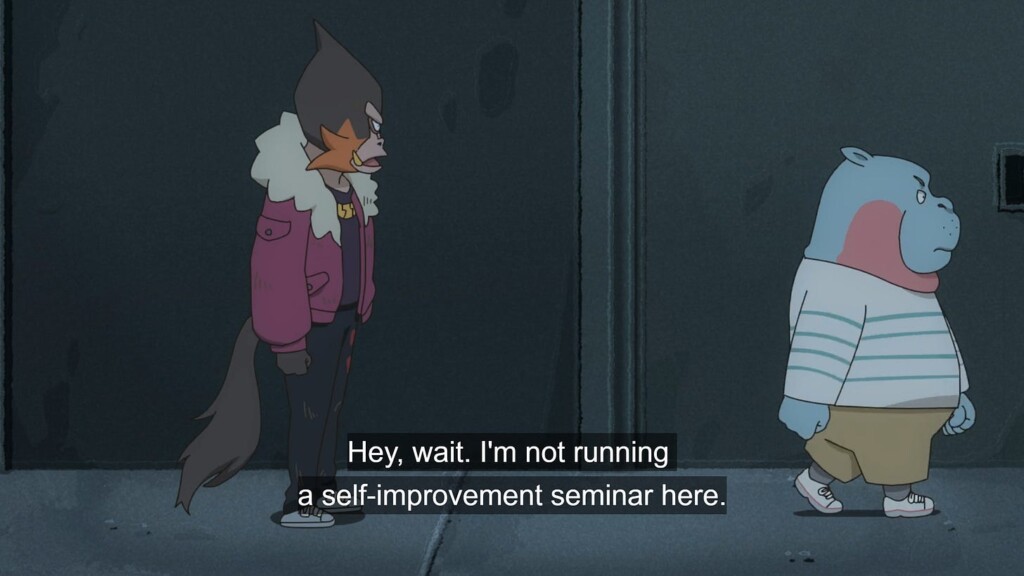
Virgil once wrote, “…I fear the Greeks even when bearing gifts.”30 In this case, beware of fake gurus selling community and belongingness! The personal development industry sells “community” to reinforce conformity. Coaches push people to believe they’re thriving by association, as long as they follow certain norms. True growth, however, is about questioning every norm, not just trading one tribe for another.
I propose this thought experiment: Revisit what I wrote earlier about spending my offline time hanging out with my peers and fans. Let’s assume in my forty years of living I’ve figured out 4% of the universal experience. Why would I want to spend my last twenty to forty years of existence hanging around people that understand less than me? The only logical conclusion is one (or both) of the following reasons:
- I want to use this information in an attempt to lord it over others or make others think I’m smart (In Herd Immunity, I refer to this as “The Smartest Person in the Room.”) or,
- I want to sell my knowledge in an attempt to make a career or revenue stream out of it.
Either way, I’m skeptical of anyone who wishes to monetize or market universal truths or universal belongingness.
Life is a single-player journey. When these gurus and thought-leaders tell their followers to create a huge social circle or join an army, this screams insecurity and monetizing the herd. If you’re an extrovert, by all means have a large social circle, but never buy access to friends. This is something a friend of mine learned the hard way. Herd Immunity dictates abstaining from joining groups because the self is the most important unit in existence. Be mindful of anyone selling you community feeling, including Alfred Adler himself. Perhaps the real self-actualization is the friends we made along the way? Nah, probably not. Carlin was right twenty years ago—there’s no mystery. You’re all just a bunch of dorks afraid to be alone with your thoughts!
The Money Racket: Selling Dogma As Development
We could take the money home
Sit around the family throne
My old dog could chew his bone
For two weeks we could appease the Almighty
Easy Money31
— King Crimson, Easy Money
Whether we like it or not, personal development has devolved into an orgy of dopamine-chasing, Instagram-flexing, and cult-like devotion to ritual and routine. Gone are the days of Harry Browne, David Viscott, or Barb Sher giving quantifiable, actionable advice that can be immediately implemented. Now, every thought leader conveniently has all the answers of the universe, and they’re happy to tell you the secrets… for a price.
Whether it’s politics, religion, dating, health/fitness, or general life advice, money-chasers love selling easy-answers, marketed as books. In a 2017 after-show, Mike David of Red Bar Radio aptly describes this phenomenon: “Amazon has print-as-you-sell [Amazon KDP]: so you type up a book, you upload the .pdf to Amazon, you pick how you want the binding and stuff, and then you sell them, and they print them on demand. So when a customer buys your book, they pop this out; the customer gets it; this takes them two seconds to print and bind, and then you get maybe four dollars.”32 He continues:
But these people now pretend they’re published authors. They’re going out, and they’re saying, “Oh, I’ve got a new book out.” No, no, no…
And people have been doing this for all time. I believe most books are scams. Most books are a money deal. That’s the incentive to write most books. Most times, any time you pick up a book, people go, “How many pages do I need to write to make this much money?” That’s why they’re writing the book. Not that, “I HAVE THIS INFORMATION; I MUST GET IT OUT TO THE PEOPLE! AND IT’S IN LONG FORMAT…” If you have that information, just do a podcast. Get on YouTube and get the information out.
But no, they continue this tradition of writing a book, which I believe is an outdated form of information, and I believe it’s mostly a time-waster. One time out of a million, a genius sits down and the only way he can convey this information is in a big, fat book. Fine. And yes, there are plenty of old books.
But the authors of today who have Twitter, YouTube, podcasts, and they’re doing all this stuff, and then taking their best moments from Twitter, and basically compiling them in a book, so that they can sell a product for $11. There is really no reason to write a book when you have instant connection with an audience right now, and you can just talk it out, and if they have a question, you can read it and answer the question. It’s actually better than school… There’s no reason for any of this.
We are holding on to traditional stuff without even thinking about how outdated it is. Even if it takes you three hours to read this, did you need all that? Or the information you needed could’ve been done in a seven-minute YouTube clip, done. Why did I need to spend three hours reading this? Oh, because you had to fill these book pages, ‘cuz you can’t sell a book that’s two pages long with all the information. It’s a scheme.33
Hell, I have two books on the market, so who am I to judge the writing racket? I’d like to thank Mike for predicting Herd Immunity in 2017, however. I had to get my genius out somehow! I’d also like to state that I happily give my books away for free (I do for any interested high school or college student), if people are interested. This is why I have no desire to be seen as some guru. I wrote my books to talk shit about society and then move on with my life! My deeper goal is to help interested parties disconnect from EVERY hyperreality, and that journey began with me shit-talking society.
I’ve stated numerous times in this article that personal development is a cult-like scam to extract money from easily-misled people. But, what if I told you that the personal development racked isn’t just secular people? That seemingly righteous men and cult-leaders also understood this, going so far as to sneak faith-based techniques into secular society to sell needless books and courses? You can search YouTube right now and find plenty of videos arguing how Think and Grow Rich author Napoleon Hill was a con artist in his own life that was posthumously venerated:



Netflix devotees can treat themselves to a documentary called Wild Wild Country and see a much different (and materialistic) side of Osho, known then as Bhagwani Shree Rajneesh. Why do we allow scam artists in life to be seen as gurus posthumously? Because in a secular society, personal development has replaced religion. Religion always needs a guru and Christ-like redemption story. What would Jesus do? He’d probably sell a book or two…Even Moneylove (which I lovingly cited in a previous section) is a three-volume piece that espouses the prosperity gospel: a Biblical justification to own and consume excess wealth, which flies directly in the face of Jesus’ teachings:
Πάλιν δὲ λέγω ὑμῖν, εὐκοπώτερόν ἐστι κάμηλον διὰ τρυπήματος ῥαφίδος διελθεῖν ἢ πλούσιον εἰς τὴν βασιλείαν τοῦ Θεοῦ εἰσελθεῖν.
Again I tell you, it is easier for a camel to go through the eye of a needle than for someone who is rich to enter the kingdom of God. (Matthew 19:24 NRSV)
Religion has always had a complicated history with easy money. Forget about Benny Hinn, Jim and Tammy Faye Bakker and Joel Osteen, look up Creflo Dollar’s sermon begging his congregation for a $65 million private jet and tell me this motherfucker is on the level!34 As YouTuber UrgentlyFiring argues in his video, Business Books Are (Mostly) Religious Propaganda, there’s a reason, “why a lot of hyper-religious people write self-help books: because they believe they are rich because they’re living in line with their God-given purpose, and that they believe they’re genuinely helping other people live in line with their ‘divine callings’ as well.”35
Personal development is a cult, and has always been embraced by religious and secular cult-leaders. There are mantras (hustle-porn lingo), rituals (morning routines), and even temples of worship (seminars; CrossFit boxes) where one can pay exorbitant sums to get easy dopamine fixes. Just like every religion and belief system, there are a few nuggets of good advice hidden behind a paywall. I argued in Herd Immunity that you must abandon dogma and challenge all belief systems. The personal development hustle culture is another extension of dogma. It is a syncretism between protestant work ethic and personal development “hustle-porn” that must be ruthlessly vetted and abandoned.
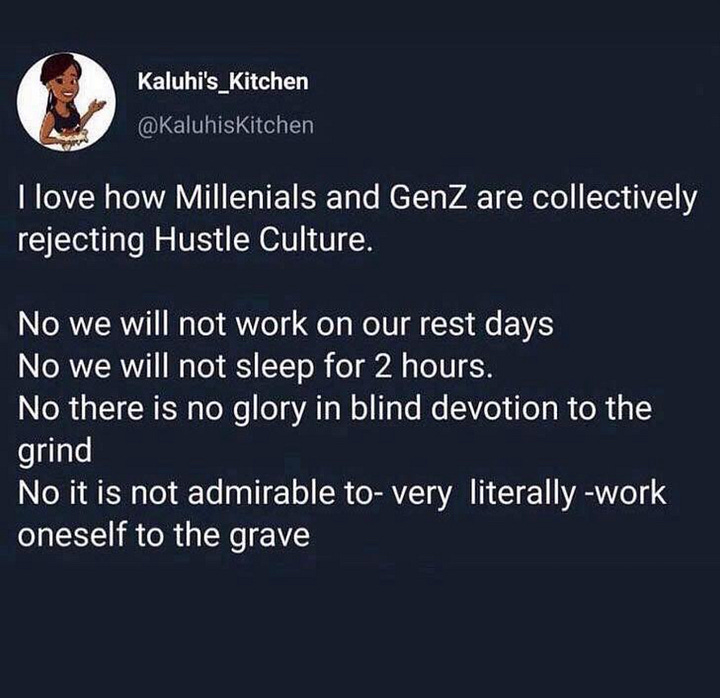

Let’s take this thesis and return to Mike David’s assertions of selling books as a racket. I’m not the first one to say this, but business books, hustle-porn, and “get-that-bag” social media clickbait are all steeped in religious propaganda. Jerry Seinfeld once famously quipped, “Adjacent to refuse, is refuse.”36 Anything adjacent to dogma, regardless of religious or secular origin, is dogma.
Personal development IS dogma. Not “Kinda-Sorta,” not “-Ish,” not “Maybe, We’ll See.” IS dogma. If you spend your days consuming personal development content, you’re being indoctrinated with pseudo-scientific information intentionally based on and cherry-picked from religious and secular ideologies. I argue that most psychology is pseudo-science anyway, but if we’re allowed to call astrology, tarot, and other holistic therapies pseudo-science, then Myers-Briggs, enneagrams, and other personal development hokum is pseudo-science as well. But don’t take my word on it, listen to a man with a background in religion.
In the opinion of YouTuber UrgentlyFiring, Steven Covey’s The 7 Habits of Highly-Effective People wasn’t just a magnum opus for business and personal development, but rather a duplicitous ploy to sneak Mormon beliefs into the business world and the public education system.37 In the intro to his video Business Books Are (Mostly) Religious Propaganda, he explains the 7 Habits is the same work as Covey’s previous book The Divine Center, just with a fresh coat of paint, substituting business terminology for religious lingo.38 UrgentlyFiring also states in the video that it’s not just mystical Hindu and Buddhist teaching or LDS dogma that has infiltrated the business space. Many of the top-selling business books are from authors who directly (or indirectly) work for religious institutions. Even if they don’t outright state their books are meant for Christian audiences, they assume their readers adhere to some basic tenets of Christianity, such as a monotheistic creator God, God gave you your unique calling or personality, and that your goal in life is harmony through said calling.39 I’d urge you to just watch his video, but in the interest of space, let’s do a quick rapid-fire game of “Fake Guru x Philosophy/Religious Organization:
- Steven Covey – The 7 Habits of Highly Effective People; LDS
- Patrick Lencioni – The 6 Types of Working Genius; Amazing Parish (Catholic Pastors)
- Bill Burnett & Dave Evans – Designing Your Life; Graduate diploma from San Francisco Theological Seminary
- Dave Ramsey – Many; Protestant Christianity
- Malcolm Gladwell – Many; Mennonites
- Dr. K – HealthyGamerGG; Hindu/Buddhist teachings
- Katharine Cook Briggs – MBTI; Repacking Jungian archetypes40
Hell, before he became the ultimate fake guru, ‘Uncle G’ Grant Cardone attributed his success in business and kicking addiction to church of Scientology.41 For even more Christian business examples, check out this blog post of 100 books on Christian Business Leadership curated by the authors of Faith Driven Entrepreneur, Henry Kaestner, J.D. Greear, and Chip Ingram.42 The greater lesson is that many business and personal development coaches command millions of dollars in book sales and five- and six-figure speaking fees to repackage religious dogma as scientific or sociological fact. Personal development is not religious in a codified or doctrinal dogmatic sense, but it tiptoes the theological line by offering lost souls a smack of spirituality, salvation, and belongingness in the physical realm. It may not be a religion, but to many it becomes religious.
I don’t just enjoy UrgentlyFiring’s video because he co-signs my theory that Myers-Briggs is pseudo-science (although I enjoy the confirmation bias).43 Whether you’re a religious or secular thought-leader, personal development presents the optimal grift. It’s the perfect marketplace for easy-answer-seekers and easy-money-chasers. I’ll let Krusty the Clown have the final word on the book grift:
Krusty: Book writing, what a scam, huh? It’s only 20 pages long, and this guy wrote it for me. What’s your name again?
John Updike: John Updike.
Krusty: Whoa, whoa. I didn’t ask for your life story.44
Real change doesn’t have cheerleaders. Self-actualization doesn’t come from adopting another’s plan; it comes from removing all others’ plans and trusting your own insights. Self-actualization comes from doing, from muting all others’ voice and listening to that little voice in your head that you’ve ignored. When you throw away everyone else’s, you’ll realize that the only thing that you need is what you’ve had the entire time: yourself.
True Growth is a Solitary, Uncompromising Path
And here I go again on my own
Going down the only road I’ve ever known
Like a drifter, I was born to walk alone
‘Cause I know what it means
To walk along the lonely street of dreams45
— Whitesnake, Here I Go Again
Take it from the misanthrope and the loner—if you want to unlearn all the nonsense you’ve consumed in your quest for self-actualization, be prepared for a long and lonely road. I’ll spare you the Green Day Boulevard of Broken Dreams Karaoke, but I think you know where I’m going with the finale…
In order for you to exist, several unlikely events needed to unfold in exactly the manner that they did. Whether you like it or not, your parents got together and conceived you. You’re here in the now, you can’t change the past or become someone else, no matter how hard you try. Until someone pulls a Last Rites of Jeff Myrtlebank and comes back from the dead to tell us there’s an afterlife, this is the only life we know for sure.46 Your body is made up of 37 trillion cells. Are you going to waste this one life and all those cells just being a pale facsimile of yourself, or masquerading as someone else? Or are you going to figure out what you want and go after it? Every time you distract yourself with bullshit work or another person’s knowledge, you delay or shortcut the actualization process.
When I refer to average people or normies as ‘speedbumps’—people that exist only to impede—this is a partial truth. People may be in your way on your morning commute or in the grocery store, but the only roadblock in self-actualization is you. Growth isn’t about adopting others’ paths dominance over life’s events, but a life-long educative process of trial and error. As David Viscott notes in Feel Free:
But the feelings you get from improving and seeing a chance should be as important to you as the final results… In other words, the weeks in your life should become a series of steps toward your goal. You should be looking at time as a friend working in your favor, not as a villain, rushing you off the face off the earth.47
…the person who embarks on a creative life and is not prepared to throw out everything he does and start again is really not going to last very long at it.48
So what does self-actualization look like? For now, perhaps this question is best answered by Zeno in the Yona of the Dawn OVA: “I wonder how many hundreds of years have passed. I haven’t been counting. People are born with the vessel that is their body, learn, and return to heaven. That is their destiny…or something like that.”49
Perhaps the only avatars one needs to analyze is Cosmo Kramer in Seinfeldor Randal Graves in Clerks. Perhaps we should all strive to do less, be less, and achieve less, and live life like The Summer of George:

Perhaps the only morning routine you need is beginning each day with Jonathan Frakes offing confirmation bias:
In parting, I’ll offer one final working hypothesis: knowledge and wisdom are two different concepts. Personal development is an attempt to sell you another man’s knowledge; self-actualization is a lifelong path of seeking wisdom through experience. The choice is yours…
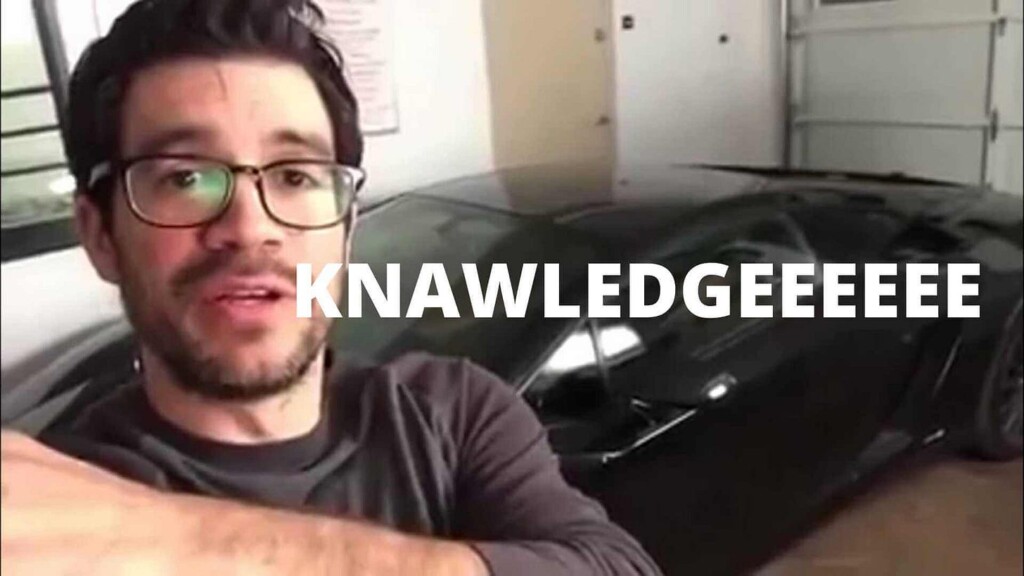
[2025 Update: My main goal for 2025 is malleability; that is the ability to adjust to changing circumstances. In Herd Immunity, I discuss how dogma prevents people from malleability; from being unable to discard failed paradigms (politics, religion, and social issues) that no longer serve them. This means in order to achieve self-actualization, I must be willing to disard anying that does not serve my final goal, as quickly as possible.
In discussing personal development and self-actualization, there’s a couple points that this article doesn’t adress, which requires this addendum:
all of the little tricks within personal devlopment—4AM wake-ups, cold showers, pomodoro techniques, intermittent fasting, saving 10% of your paycheck—these “hacks” only address the symptoms of a larger issue. Self-actualization addresses and cures the disease of the soul.
If you want to achieve a certain state of reality (self-actualization), you must achieve a certain character, not BECOME a different character, as many gurus would preach to you. You don’t do this through changing your behviors or adopting new techniques. If you can fix the emotional cycle through which you self-sabotage, you can fix the bad behavioral cycle.]
1 Ogburn, Jr., Charlton. 2002. The Marauders: The Classic WWII Account of Merrill’s Marauders—the now legendary fighting units left behind in the jungles of Burma. New York: Overlook Press, 60.
2 Eurch, Tasha, 2018. “What Self-Awareness Really Is (and How to Cultivate It).” Humintell. 2018 January; https://www.humintell.com/wp-content/uploads/2019/06/What-Self-Awareness-Really-Is-and-How-to-Cultivate-It.pdf
3 The Twilight Zone. 1964. Season 5, Episode 16. “The Self-Improvement of Salvadore Ross.” Directed by Don Siegel. Written by Jerry McNeely. Aired January 17, 1964, on CBS. Imagine Entertainment. Blu-Ray Disc, disc 3.
4 Ibid.
5 Ibid.
6 Wikipedia. 2024. “Wikipedia: The Self Improvement of Salvadore Ross.” Wikimedia Foundation. Last modified October 24, 2024, 21:51. Accessed December 17, 2024. https://en.m.wikipedia.org/wiki/The_Self-Improvement_of_Salvadore_Ross
7 The Twilight Zone, “The Self Improvement of Salvador Ross.”
8 Ibid.
9 Ibid.
10 The Simpsons. 1993. Episode 8F10. “I Married Marge.” Directed by Jeffrey Lynch. Written by Jeff Martin. December 26, 1991, on Fox. 20th Century Fox. DVD, disc 3.
11 Viscott, David. 1971. Feel Free. New York: Dell Publishing Co. Inc, 172.
12 Ibid., 165.
13 Ibid., 153.
14 The Simpsons. 1993. Episode 1F05. “Bart’s Inner Child.” Directed by George Meyer. Written by George Meyer. November 11, 1993, on Fox. 20th Century Fox. DVD, disc 3.
15 Harron, Mary, director. 2000. American Psycho. Lions Gate Films, 2007. Blu-Ray Disc, 1080p HD.
16 BetterU. 2024. “Why Self Improvement is Ruining Your Life” June 22, 2024. Accessed December 17, 2024. YouTube. 2:40. https://www.youtube.com/watch?v=mTgVZSD3U8U
17 Viscott, 155.
18 REDBAR x SCARSCLUB. 2019. “Philip DeFranco Video Game SCAM | RAID: Shadow Legends | Mobile Games Are Cringe,” August 8, 2019. Accessed September 17, 2024. YouTube. Video, 11:34. https://www.youtube.com/watch?v=Eokp61z-oBU
19 Toradora. 2008. Season 1, Episode 3. “Your Song.” Directed by Eiichi Kuboyama. Written by Mari Okada. Aired October 16, 2008, on TV Tokyo. https://www.crunchyroll.com/watch/G65VJXDE6/your-song
20 Gillies, Jerry. 2018. MoneyLove 3.0 Vol 1: A Digital Age Prosperity Masterpiece. UNKNOWN, Kindle edition, Loc 937.
21 Ibid., loc 949.
22 Chase Hughes. 2024. “Life is a Video Game: Here’s How to Win,” September 30, 2024. Accessed March 17, 2024. YouTube. Video, 17:20.
23 Complaints and Grievances, written and performed by George Carlin, directed by Rocco Urbisci, Beacon Theatre, New York, NY, November 17, 2001. Aired on HBO, November 17, 2001.
24 TheImmortalLowlife [pseud.]. 2022. “Michael David on Compound Media EP 7” January 24, 2022. Accessed December 17, 2024. YouTube. 1:16:16. https://www.youtube.com/watch?v=OU_U7cYMpF8
25 @insert [pseud.]. 2022. “Andrew Tate’s “The Real World” is stealing my software.” Insrt.uk. December 5, 2022. Accessed December 17, 2024. https://insrt.uk/post/andrew-tate-stealing-software-revolt
26 No Text To Speech [pseud.]. 2022. “I Tried Andrew Tate’s Discord Clone…” November 11, 2024. Accessed December 17, 2024. YouTube. 37:43. https://www.youtube.com/watch?v=mV98gVg36p0
27 Cal Newport. 2024. “The Perks of Living Without Social Media | Cal Newport.” May 15, 2022. Accessed December 17, 2024. YouTube. 13:17. https://www.youtube.com/watch?v=m6AF_aFuD8w
28 Ibid, 8:50.
29 ODDTAXI. 2021. Season 1, Episode 9. “The Hero’s Melancholy.” Directed by Ken’ichi Nishida. Written by Hiromi Nakayama. Aired June 1, 2021, on TV Tokyo. https://www.crunchyroll.com/watch/GEVUZ8Z1J/the-heros-melancholy
30 Martin, Gary. “What’s the meaning of the phrase ‘Beware of Greek bearing gifts’?”. PhraseFinder. n.d. accessed December 17, 2024. https://www.phrases.org.uk/meanings/beware-of-greeks-bearing-gifts.html
31 King Crimson. 1973. “Easy Money.” Track 4 on Larks’ Tongues in Aspic, Island, Atlantic. Spotify streaming audio, 320 kbps.
32 David, Mike. “Red Bar Radio (01-06-17) Part 1.” Red Bar Radio. Podcast audio, January 6, 2017. https://redbarradio.net/archives/01-06-17
33 Ibid, 2:31:20.
34 James Jani. 2022. “The Dark World of Megachurches.” February 27, 2022. Accessed December 17, 2024. YouTube. 32:16. https://www.youtube.com/watch?v=hTfKpAWkgJY
UrgentlyFiring [pseud.]. 2024. “Business Books are (mostly) Religious Propaganda.” November 15, 2024. Accessed December 17, 2024. YouTube. 19:46. https://www.youtube.com/watch?v=A_hH-JkXD_c
Seinfeld. 1994. Season 6, Episode 6. “The Gymnast.” Directed by Andy Ackerman. Written by Alec Berg & Jeff Schaffer. Aired November 3, 1994, on NBC. https://www.netflix.com/title/70153373
37 UrgentlyFiring, “Business Books are (mostly) Religious Propaganda,” 0:45.
38 Ibid., 2:55.
39 Ibid., 7:15.
40 Ibid., 5:45.
41 VladTV. 2019. “Grant Cardone: Becoming a Scientologist is the Secret to My Success (Part 6).” November 19, 2019. Accessed December 17, 2024. YouTube. 6:19. https://www.youtube.com/watch?v=q1ocR1iu5TA
42 Faith Driven Entrepreneur. 2022. “Top 100 Books on Christian Business”. FaithDrivenEntrepreneur.org. January 28, 2022. accessed December 17, 2024. https://www.faithdrivenentrepreneur.org/top-books-1
43 UrgentlyFiring, “Business Books are (mostly) Religious Propaganda,” 12:40
44 The Simpsons. 2000. Episode BABF17. “Insane Clown Poppy.” Directed by Bob Anderson. Written by John Frink & Don Payne. November 12, 2000, on Fox. 20th Century Fox. DVD, disc 1.
45 Whitesnake. 1982. “Here I Go Again.” Track 6 on Saints & Sinners, Liberty/EMI. Spotify streaming audio, 320 kbps.
46 The Twilight Zone. 1962. Season 3, Episode 23. “The Last Rites of Jeff Myrtlebank.” Written and Directed by Montgomery Pittman. Aired February 23, 1962, on CBS. Imagine Entertainment. Blu-Ray Disc, disc 4.
47 Viscott, 254.
48 Ibid., 257.
49 Retro x Modern Anime [pseud.]. 2024. “【OVA Yona of the Dawn (Akatsuki no Yona) Episode 01–03 | English SuB.” June 16, 2024. Accessed December 17, 2024. YouTube. 1:12:34. https://www.youtube.com/watch?v=_jSX07txlDM
50 Seinfeld. 1997. Season 8, Episode 22. “The Summer of George.” Directed by Andy Ackerman. Written by Alec Berg & Jeff Schaffer. Aired May 15, 1997, on NBC. https://www.netflix.com/title/70153373
51 Ben O’Donnell. 2019. “Jonathan Frakes Telling You You’re Right for 41 Seconds.” June 2, 2019. Accessed December 17, 2024. YouTube. 0:41. https://www.youtube.com/watch?v=MCT80HJWQ2A
52 Tai Lopez. 2015. “Here In My Garage (Official): Lamborghini, Knowledge, And Books With Tai Lopez.” September 2, 2015. Accessed December 17, 2024. YouTube. 0:41.


Chasing the Dragon – Reality Unveiled
[…] Sleepwalkers […]